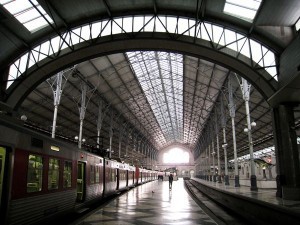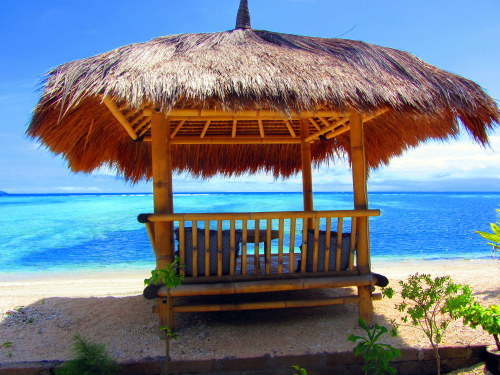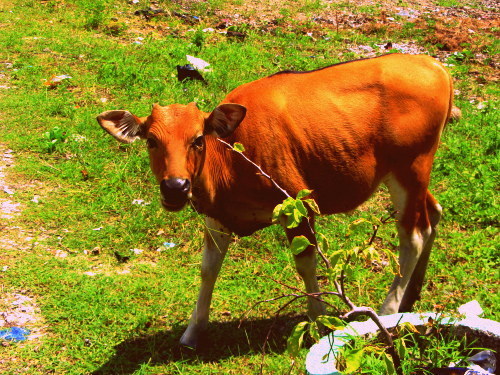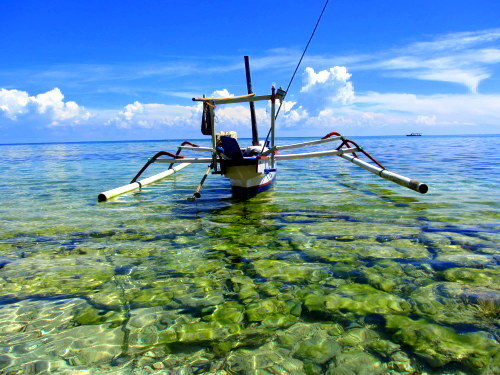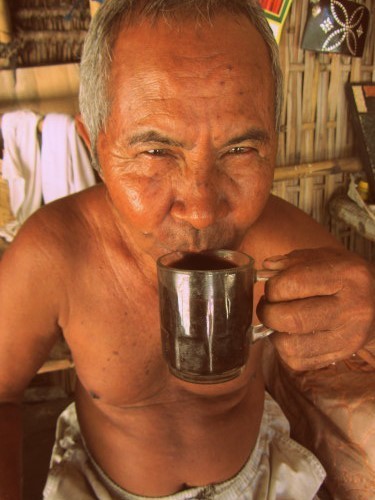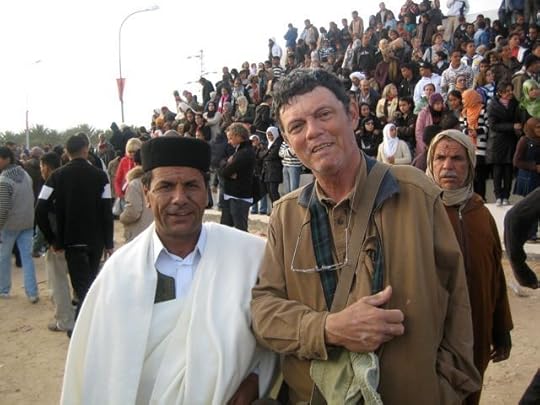Rolf Potts's Blog, page 58
July 16, 2013
Midnight at the oasis: A snapshot from Douz, Tunisia
Vagablogging :: Rolf Potts Vagabonding Blog
 Whoever idealized the serene night scene of Berber tents surrounding an oasis, fires flickering, a reflection of the stars above, the quiet hum of insects and maybe a bedouin bathing by moonlight had obviously NOT actually spent a night at an oasis; especially on a festival night.
Whoever idealized the serene night scene of Berber tents surrounding an oasis, fires flickering, a reflection of the stars above, the quiet hum of insects and maybe a bedouin bathing by moonlight had obviously NOT actually spent a night at an oasis; especially on a festival night.
If there is one thing that an oasis night is not, under any circumstances, it is quiet. There is really no way to describe the cacophony of sounds that paint the darkness: donkeys braying, dogs barking, cats calling, camels roaring (they don’t exactly roar, but they are certainly making their best attempt.) Add to that the clip clop of horse hooves, followed closely by the squeak of the wheels of the cart it is pulling, the low level drone of Arabic, whispers, conversations, laughter, shouting and singing and it is a symphony that echoes out onto the desert and disappears into the darkness.
The drumming started just at bed time. BOM-bah-bah-bah-BOM-bah-bah-bah-BOM-BOM-BOM-bah-bah-bah…. The constant beat of skin drums beaten with smooth sticks by men in ankle length, hot pink robes and green vests topped by red hats hung with long black tassles, reminiscent of a horse’s tail, attached at the center. The high, shrill trilling of the Bedouin women accompanying their beat: “HIEEEELA-la-la-la-la-la-la-la-la-LA!” BOM-bah-bah-bah-BOM-bah-bah-bah…. There was no sense in putting in earplugs and trying to sleep. The only thing to do was lay awake in the deep dark and frosty cold of the desert night and enjoy the symphony, trying to burn it into my sound memory for the deep dark and frosty cold of my ancient days, sixty years from now.
Then, sometime after midnight, as suddenly as if a switch had been thrown: quiet. No more drums, no more people sounds, only the lonely donkey’s cry or dog’s bark. We emerged from the tent to make a run to the bathroom, our breath hanging in the frosty air. Desert nights, especially in winter, hover around the freezing point. It was impossible to rush (as my chilly self wanted to do) across the sand to the bath house. We had to stand, heads held aloft and look at the stars. It is hard to believe that these are the same stars that watch over us in the pine forests of northern New England, but they are, the stars of the northern hemisphere: Ursa Major and Minor, the Pleiades and Orion, standing like an arab warrior over the ocean of sand. The moon was no where to be seen, hidden among the date palms at the edge of the horizon, perhaps, but the stars more than made up for its light. The desert stars alone were worth the trip.
Between drumming and the dawn prayers came three or so hours of twilight sleep. Douz has at least four mosques, each of which seems to pride itself on the accuracy of timing their morning prayers, and they certainly do not agree. The first wail arose at five thirty, sharp, and it was nearly half an hour before the last song faded into the semi-darkness. The sound of the muezzin is an effective alarm clock and reminds even we infidels that Allah is, indeed, Akbar. Emerging from our green tents, blowing on our frozen fingers, starting the fires that will result in coffee and tea we greeted Christmas Day on the edge of the Grand Erg Oriental, while Gramps hummed the inevitable under his breath: “Midnight at the Oasis” by Maria Maldaur (1973).
Visit this link to hear a version of the song by Renee Olstead.
Original article can be found here: Midnight at the oasis: A snapshot from Douz, Tunisia
July 14, 2013
The travel writer does not merely purvey information
Vagablogging :: Rolf Potts Vagabonding Blog
“The travel writer does not merely purvey information; that is for the Karl Baedekers, the sober compilers of guidebooks. His role is to be the tourist’s perfect companion: to be articulate, well informed, a skilled raconteur; to include in what he tells a fair share of the unusual with a dash of the exotic; to tell it all with infinite zest. It was Herodotus who set not only the pattern, but the standard.”
–Lionel Casson, Travel in the Ancient World , (1974)
, (1974)
Original article can be found here: The travel writer does not merely purvey information
July 13, 2013
Voices needed for Vagabonding audiobook
Vagablogging :: Rolf Potts Vagabonding Blog
 Ten years after its initial debut in paper form, Vagabonding is set to go into an audiobook edition this fall. I’ve recorded the main text, but now I need to add some new “Vagabonding Voices”.
Ten years after its initial debut in paper form, Vagabonding is set to go into an audiobook edition this fall. I’ve recorded the main text, but now I need to add some new “Vagabonding Voices”.
If you’re interested in possibly appearing as a Vagabonding Voice in the audiobook, start by sending me, as text in the body of an email (rolf@rolfpotts.com), no more than 150 words (less is better, actually) of insight, per topic, on one or more of the following topics:
2: Making the decision to go, and earning your freedom
3: Simplicity, and saving for the trip
4: Planning and preparing for the journey
5: Getting started, slowing down, going your own way
6: The importance of interacting with people on the road
7: Seeking a more nuanced definition of “adventure”
8: Keeping it real, avoiding pretentiousness and false expectations
9: Working, volunteering, and mixing things up on the road
10: The spiritual-existential aspects of travel
Note that each topic is pegged to a specific chapter in Vagabonding; thus it’s a good idea to re-read the book to get a sense for what I’m looking for.
Deadline is July 26th. Feel free to submit insights for more than one chapter, but keep the word-count under 150 for each. Be sure to include your name, age, hometown, and profession in your submission (see Vagabonding Voices examples in the print version of Vagabonding).
Once the deadline has passed, I will choose 10-12 finalists for each chapter and solicit audio recordings (along with instructions for how to record and upload your audio). From these finalists, 3-4 audio outtakes for each chapter will make it into the audiobook.
I can’t offer payment to those who make the final cut, but I will give you and/or your blogs a shout-out online (and, of course, you’ll have an audio-contributor appearance in the book). If you don’t hear back from me by the beginning of August, this likely means my editors and I haven’t chosen your insights for the book.
Again: Send text first, by email, 150 words or less per chapter-insight, deadline July 26th.
Original article can be found here: Voices needed for Vagabonding audiobook
July 11, 2013
Scars from Scotland and Bills from Budapest
Vagablogging :: Rolf Potts Vagabonding Blog
A good traveler knows that it isn’t the number of places you’ve been that counts, it’s the number of meaningful experiences. Just like the saying, “it’s not the number of breaths you take that matters, it’s the number of moments that take your breath away.” Same with traveling. Miles mean little, so do stamps in your passport. That stuff is ancillary to the true story: the adventures themselves (be they emotional, fun, or just plain interesting) and the souls you were lucky enough to encounter along the way.
For example, a friend asked me today, “So how many places have you been to?” I get asked question a lot. My answer is always, “I don’t know. Never counted. But you know what? I’ve got a scar from Scotland, some friends from Florence and a parking bill from Budapest.”
All true, and all linked to great travel memories. All the best travelers use this sort of yardstick to measure their experiences abroad. The key is perspective: think qualitatively, not quantitatively.
Having said that, I think it’s safe to assume the Hungarian police have given up expecting me to pay that stupid fine they left on my windshield. To this day I’m not quite sure what it says on that thing, but it looks cool in a frame. As for the scar from Scotland, that’s another story altogether.
Original article can be found here: Scars from Scotland and Bills from Budapest
July 9, 2013
The Four Agreements by Don Miguel Ruiz
Vagablogging :: Rolf Potts Vagabonding Blog
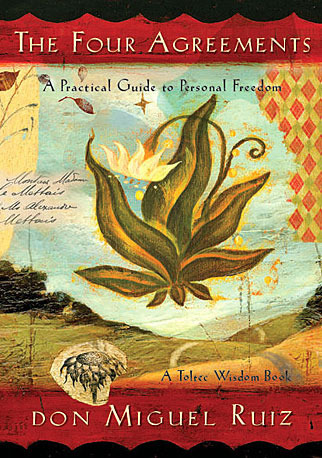 I read a book a while back that I’ve been noodling again recently. It’s called The Four Agreements by don Miguel Ruiz. I found it in an English language bookshop in Panajachel; the one back inside the tourist trap restaurant by the Chicken Bus stop, not the one down in the pink building by the post office. I would have passed it over completely if it hadn’t just been recommended by a friend. I rented it for two weeks (yes, you can rent books there) and tried to keep it dry reading the first chapters on the long, choppy lancha ride home, to the far end of the lago that afternoon.
I read a book a while back that I’ve been noodling again recently. It’s called The Four Agreements by don Miguel Ruiz. I found it in an English language bookshop in Panajachel; the one back inside the tourist trap restaurant by the Chicken Bus stop, not the one down in the pink building by the post office. I would have passed it over completely if it hadn’t just been recommended by a friend. I rented it for two weeks (yes, you can rent books there) and tried to keep it dry reading the first chapters on the long, choppy lancha ride home, to the far end of the lago that afternoon.
The essence of this book is a call to living from your higher self and a road map for doing so. It’s become something I return to when I need to refocus on the journey, both internally and externally.
The Four Agreements are:
1. Be Impeccable with your Word:
Speak with integrity. Say only what you mean. Avoid using the Word to speak against yourself or to gossip about others. Use the power of your Word in the direction of truth and love.
2. Don’t Take Anything Personally:
Nothing others do is because of you. What others say and do is a projection of their own reality, their own dream. When you are immune to the opinions and actions of others, you won’t be the victim of needless suffering.
3. Don’t Make Assumptions:
Find the courage to ask questions and to express what you really want. Communicate with others as clearly as you can to avoid misunderstandings, sadness and drama. With just this one agreement, you can completely transform your life.
4. Always Do Your Best:
Your best is going to change from moment to moment; it will be different when you are healthy as opposed to sick. Under any circumstance, simply do your best, and you will avoid self-judgment, self-abuse, and regret.
Sounds simple, doesn’t it?
I’ve read the weighty philosophers and I’ve read the modern drivel designed to boost self esteem and sort out our childhood issues, but these four agreements, that we make with ourselves, are seminal. Of course the book delves deeply into the other agreements we’ve made with ourselves and our communities that hold us back and keep us from living fully. I love his discourse on how the world, and all of life is a dream we create for ourselves. That will keep you thinking for a while.
So have you read it? If not, I recommend it, heartily!
Original article can be found here: The Four Agreements by Don Miguel Ruiz
July 7, 2013
Globalization has replaced the future as the site of “utopia”
Vagablogging :: Rolf Potts Vagabonding Blog
“A life spent in transit like this is bound up with equal degrees of hope and fear. On the one hand, artists are now given the possibility of evading the pressure of prevailing local tastes in a relatively painless way. Thanks to modern means of communication they can seek out like-minded associates from all over the world instead of having to adjust to the tastes and cultural orientation of their immediate surroundings. This, incidentally, also explains the somewhat de-politicized condition of contemporary art that is so frequently deplored. In former times artists compensated for the lack of response to their work among people of their own culture by projecting their aspirations largely on the future dreaming of political changes that would one day spawn a new and future viewer of their work. Today the utopian impulse has shifted direction: acknowledgement is no longer sought in time, but in space: Globalization has replaced the future as the site of utopia. So, rather than practising avant-garde politics based on the future, we now embrace the politics of travel, migration and nomadic life, paradoxically rekindling the utopian dimension that had ostensibly died out in the era of romantic tourism. This means that as travelers we are now observers, not so much of various local settings, than of our fellow travelers, all caught up in a permanent global journey that has become identical with life in the world city.”
–Boris Groys, “The City in the Age of Touristic Reproduction“, Art Power, 2008
Original article can be found here: Globalization has replaced the future as the site of “utopia”
July 4, 2013
Vagabonding Field Report: Finding paradise on the Gili Islands of Lombok
Vagablogging :: Rolf Potts Vagabonding Blog
Cost/day: $35/day-room, Average $10 per meal
What’s the strangest thing you’ve seen lately?
The cows! I don’t know why, but I just didn’t expect to see cows on such a small island. I mean you can walk around these islands in about 90 minutes, and when I saw my first one, I thought I’d been in the sun a little too long. There are also tons of cats on the Gili Islands. I think they are what give the Gili Islands such magical energy.

Describe a typical day:
The days are long and lazy. I based myself off of Gili Trawangan (but wished I had picked Gili Air). After a long morning walk on the beach, I usually caught a boat to either Gili Air or Gili Meno and enjoyed the peace and tranquility there. I walked around the islands talking to the local people, taking lots of pictures, enjoying the warm sea air, and just felt myself relax in a really deep way.
Describe an interesting conversation you had with a local:
I met an amazing artist names Botel. His joy for life was contagious. We talked about the beauty of the day, the present moment. The present moment was him enjoying his cup of coffee. We didn’t talk about the past or where I had come from. We just were. Mostly we sat and enjoyed the silence and each other’s presence.
What do you like about where you are? Dislike?
I love the stunning blue clearness of the water, the sparkling white sand, the “getting away from it all” feeling that I had. I loved eating fresh fish that they had caught everyday. I loved the intense joy that everyone on the islands seemed to have. People truly lived in the moment. I disliked the loud party scene on Gili Trawangan. When I went seven years ago, it was very chill. Open-air bars, couches in the moonlight, Pink Floyd and Jimi Hendrix playing. Now it’s a big loud party scene. Next time, I will stay on Gili Air!
What new lesson did you learn?
The Gili islands reminded me that all we have is now. Being there brought me back to the moment. I didn’t think of the past or what would be happening in the future. I just was-in the moment.
Where next?
Who knows? I am letting the moment guide me. Being spontaneous. Letting the wind and waves guide me. Right now, I’m heading over to the hammock.
For more about my travels and great advice on beaches and islands, check out my website This Way To Paradise and my Facebook page!
Original article can be found here: Vagabonding Field Report: Finding paradise on the Gili Islands of Lombok
Overlanding: China Mainland into Hong Kong
Vagablogging :: Rolf Potts Vagabonding Blog
As I noticed that readers enjoyed my post on China bus travel , I thought to continue giving some extra advice on the Middle Kingdom…
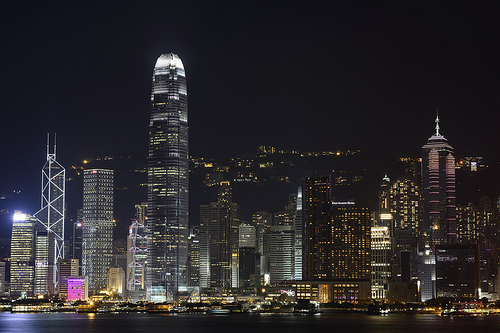
Image Credit: Flickr/SBoyd
So are you departing from China, right? You have indeed a few border options: Mongolia, Russia, Kyrgyzstan, Pakistan… or probably much easier: Hong Kong.
So many people cross into Hong Kong daily from the mainland. Some to fly back home, or to renew their Chinese visas. Whatever is your reason to come to Hong Kong, this brief post will explain how to get there overland. My personal favorite way.
Shenzen
Hong Kong’s sister city sits in the mainland, and connects through easy customs. There is not that much in Shenzen to lure you in, but if you have time, try to check out the art districts and the commercial center. Shenzen is a jewel of booming China’s architecture, and boasts spacious lanes and has a definitely “western” feel. There are many connections to Shenzen. You may connect to Shenzen by sleeper bus from the North: popular Guilin in Guanxi is 10 hours overnight ride away. Guangzhou is otherwise the hub from incoming traffic. From Shenzen main bus station, cross the road and avoid the taxi driver touts and get to the bus stop. For only 2 yuan, bus 7 will take you directly to the main train station and Luo Hu exit/entry point. Get off at the last stop, and keep your right: Luo Hu is in front of you. A fast 10 minute walk will get you trough customs and out of Mainland China, and a further 5 minutes walk will get you into Honk Kong territory proper. Take an LRT train from there and get to your central destination changing trains at Kowloon Tong station. Welcome to Hong Kong!
Macau
With more time and money on your hands, make Macau an interesting stop on your way out of the Mainland. Coming from Guilin or the North, reach Guangzhou first, and then Zhu Hai. By train, you will most likely have to reach Guangzhou first, but it is possible to get some sleeper buses and travel to Zhu Hai directly. Zhu Hai itself is a nice harbor town, and you might want to linger for a bit, enjoying its breezy air and detached atmosphere. From here, the cross into Macau is straightforward.
Be forewarned: your passport will be stamped, so check if your nationality allows you visa-free entry into Macau territory. Most likely, the answer is yes. If not, a visa on arrival will be generally issued for around 20 US $. Macau is quite compact, made up by the peninsula of Taipa and the island of Coloane, and can be walked on foot in a few hours. From its main jetty, half hourly boat departures to Hong Kong make a scenic entry into the city, for 150 HK $ one way. Once in Hong Kong, your passport will be stamped again. Indeed, a nice collection of foreign ink!!
These routes make for a straightforward, easy entry or exit from China. Remember that you need to be on a double entry visa to activate your second stay in the Mainland or you will have to get a new visa once in Hong Kong in order to get back in trough Shenzen or Macau/Zhu Hai. If you only intend to visit Macau from Hong Kong, Chinese visas are not necessary… have fun!!
Original article can be found here: Overlanding: China Mainland into Hong Kong
July 2, 2013
The art and science of haggling
Vagablogging :: Rolf Potts Vagabonding Blog
“Watch this Gramps,” he hissed to my Dad, “Do you know how to get the best price on a taxi? This is how… just watch Mom!”
My Dad chuckled, Ez continued his play by play narration:
“The cab driver will pull up, and Mom will ask him how much…. see…. okay, now she laughs, slams the door, thanks him and walks away…. now watch, he’s gonna follow her and roll the window down… he’ll give her a lower price, but she’ll keep walking… then he’ll ask her for her price… then he’ll laugh, but she’ll keep walking… and we’ll get it for her price in a minute!”
My Dad smirked at the boy, amused, “Gee, I wonder where she learned that?” From him, of course.
Haggling is both an art, and a science. There is a formula to it, the back and forth, the informed negotiation of knowing what a fair price is, and knowing how to “play the game.” Then there’s the flare of it, having fun, keeping everyone smiling and laughing, making sure it feels like a game, and not someone getting the shaft.
Haggling is expected in much of the world, it’s how business gets done, and it’s not something to be afraid of, it’s something to be enjoyed, and when you get good at it, there’s a certain amount of cultural respect that comes with being able to negotiate the nuances of a transaction and come to a fair price for everyone concerned.
It was a point of pride for me when I met a friend, who lives there, for lunch in Ubud, Bali, having spent the morning shopping for treasures at the local arts market, and he commented, “I see you got a good price, what did you buy?” I showed him.
“How do you know I got a good price?” I asked, quizzically.
“Black bag. If you get the white bag with stripes, it means you’ll pay too much, the other vendors will see you coming!” After that I carried my black bag everywhere.
I spent the better part of an afternoon as my Dad’s translator, slowly working an Tunisian fellow down on his price for a bernouce that my Dad was determined to wear home. “Your father, he is a hard man!” the seller announced, as my Dad forced me to really put the screws to the guy. “Tell me about it!” I quipped, “Try growing up with this kind of negotiator!” We both laughed, feeling one another’s pain. He acquiesced to my Dad’s bottom dollar price.
And then, my Dad handed him a wad of bills that he’d pre-prepared and tucked into his front pocket: the price he was willing to pay for the item in question, and not a dinar more. The man unrolled the bills and started to count: a wide grin crossing his face, he clapped my Dad on the shoulder, they laughed together and grinned hard across the language gap. Dad had paid 50% more than the price he negotiated the poor guy into a corner over.
There are two lessons I learned at my father’s knee about the art and science of haggling:
1. Don’t be afraid to do it!
When it’s culturally appropriate, haggle like crazy, keep your sense of humor and have a great time playing the game. Don’t be afraid to walk away, but never enter into negotiations if you aren’t prepared to follow it to the end. Haggling can be great fun and a good way to make friends!
2. Don’t be a cheap bastard!
Just because you CAN get that lady who is desperate to sell her weavings down to $5 USD for something you know darn well should be worth $30 doesn’t mean you should pay that. Play the game, negotiate hard, and then pay a fair price, preferably at least 50% more than you bargained down to, and in many cases, their asking price is still an excellent deal. If you’ve bargained hard, you’ve gained their respect, you’ll gain even more by demonstrating that you know the real value of what you’re buying.
What are your great haggling stories? Do you have a method that works for you?
Original article can be found here: The art and science of haggling
June 30, 2013
The traveler is ever more necessary as a witness and reporter
Vagablogging :: Rolf Potts Vagabonding Blog
“1,000 people died in a rural village in Ivory Coast; this was a small news item in the western press, though when one person is injured in Jerusalem it’s on the front page as an outrage. I’d like to know why this is so. The fact that there are far fewer foreign correspondents makes the traveler more necessary as a witness and a reporter.”
Paul Theroux, “The places in between“, FT.com, May 27 2011
Original article can be found here: The traveler is ever more necessary as a witness and reporter
Rolf Potts's Blog
- Rolf Potts's profile
- 323 followers


